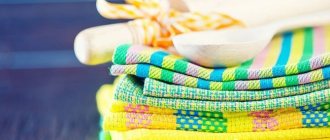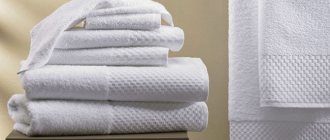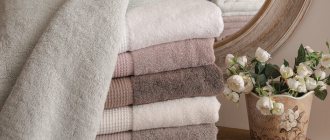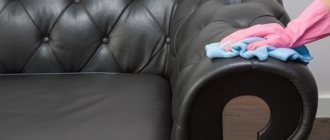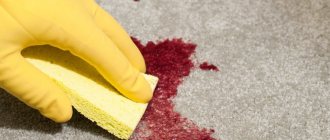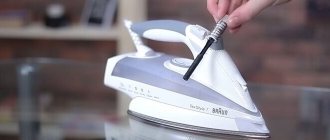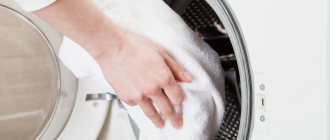The cleanliness and tidiness of kitchen textiles worries every housewife. Kitchen towels perform not only a practical, but also an aesthetic function - they set accents in the interior and add coziness. But how to protect textiles from stains? How to wash kitchen towels and get rid of stubborn dirt? Especially for you, an overview of the most effective and affordable methods is in our article.
The cleanliness and appearance of kitchen towels is important
The simplest way with vegetable oil
Washing kitchen towels with vegetable oil sounds strange, but the trick is adding bleach and powder. The result is a “super soap” that penetrates deep into greasy stains and destroys them without a trace!
The recipe looks like this:
- Boil about 5 liters of water in a large saucepan. This is enough for 7-9 towels.
- Then pour the water into a basin, add a tablespoon of loose stain remover and 3 tablespoons of washing powder. Then pour in 5-10 g of sunflower oil (camelina and rapeseed oil are also suitable).
- Wet the towels with COLD water and throw them into boiling water to soak for 15 hours.
How to starch?
If you want your kitchen towels to look presentable, try starching them.
For the procedure you will need 1 liter of water and a little potato starch. The concentration of the substance is determined based on the thickness of the products. For kitchen towels, 50–60 g of starch per 1 liter of water is usually enough.
To begin, thoroughly dilute the substance in 100–150 ml of water. Pour the remaining liquid into a saucepan and bring to a boil. Pour the starch solution into the water in a thin stream and cook until the mixture becomes clear. Dip the items into the liquid and let them soak in the solution. After this, wring out the towels and send them to dry.
If you don’t have time for the procedure, you can use a ready-made product in the form of a spray or liquid starch
In the microwave
There is a proven method of boiling, which also does not always work and often ruins the fabric. You can speed up the process using a microwave:
- Soak the towels in cold water and rub generously with laundry soap.
- Then squeeze it out a little and put it in a cellophane bag.
- Place in the microwave oven for 5 minutes at full power.
If the method does not help remove old greasy marks from kitchen towels, repeat the process again. Residues can be removed with hydrogen peroxide.
Oxygen bleach
How to wash a kitchen towel with numerous ketchup or jam stains? Oxygen bleach will help!
How to clean the oven from grease and carbon deposits: tips and more effective methodsWhat to do if your kitchen sink is clogged: how to clear the clog yourself
Installing a siphon under a kitchen sink with your own hands: assembly and connection diagram
Attention, not “Whiteness”, etc. facilities. These are chlorine-containing liquids that will “kill” the washing machine and ruin the item.
- Wet the towels and throw them into the machine.
- Add bleach (usually 170 ml) to the compartment marked || and set the long wash cycle to the highest temperature.
Boiling: will it help or not?
The traditional way to clean kitchen towels is by boiling. This method was often used in the past.
But you should not take it into service as the main one for several reasons:
- colored kitchen towels should not be boiled, as they may fade or lose color;
- Suitable for white cotton fabrics only;
- intense exposure to high temperatures can lead to rapid wear of the material;
- Pre-washing is necessary to remove the main contaminants, otherwise under the influence of high temperatures they will, on the contrary, become fixed.
Digestion is a rather lengthy process . To achieve the result, towels must be boiled using soda or another product for at least an hour, then rinsed and washed again.
The video will show you how to remove grease stains from fabrics and towels by boiling:
Table vinegar
If a towel has been left for a long time, germs accumulate on it, causing a terrible musty smell. Even washing doesn’t always get rid of it, but vinegar will help. It creates an acidic environment in which microorganisms cannot survive:
- Pour 1.5 liters of very warm water into a basin.
- Add a faceted glass of vinegar. Take regular tableware, but not essence!
- Throw a towel in there to soak for 12 minutes.
- Then remove and rinse thoroughly in running water.
The smell will disappear, and it will be easier to wash kitchen towels from old greasy stains, since vinegar partially dissolves them.
Useful tips
The following tips will help extend the life of kitchen textiles:
- For the kitchen, it is most rational to choose waffle and microfiber towels. They dry faster and are easier to wash and rinse. Terry products get dirty and rot faster.
- Wet towels should be placed immediately to dry. Otherwise, a persistent musty odor may appear.
- Kitchen textiles should be washed at least once every 1-3 days. Fresh dirt comes off easier.
- For cleaning, removing grease and dirt in the kitchen, it is better to use disposable or microfiber napkins, and leave fabric ones for hands and dishes.
- Kitchen towels should be washed separately from other items.
- It is better to alternate detergents and stain removers, and use aggressive chemicals no more than once a month.
The cleanliness and shining color of kitchen towels is beautiful and hygienic, it puts you in a good mood in the kitchen and makes working with dishes or at the stove pleasant. Not to mention that this is a valuable touch to the hostess’s image. Even the mother-in-law won’t find anything to complain about.
Edible lemon
Lemon is also an acid that effectively removes fatty residues. Before the procedure, you need to wash the towel with regular washing powder, and then:
- Sprinkle the powder generously onto the stains. It is better to take finely ground lemon or grind it yourself in a mortar - this way it will begin to react faster.
- Leave it for an hour to form a stable acidic environment.
- Then wash the item in running water. You can add soda to “quench” the remaining lemon juice.
Hydrogen peroxide
Peroxide is a powerful oxidizing agent and solvent. It does a good job of removing greasy marks and yellowing on textiles, including old ones. Just wet the trail and forget about the towel for a few hours.
How to wash a suspended ceiling so it looks like newHow to get rid of fruit midges in an apartment: effective ways and methods
The most interesting and useful little things for your kitchen
By the way, peroxide has a “big brother” - a cosmetic hair oxidizer. You need to work with it more carefully, but the efficiency is also higher.
Important, the oxidizing agent is EXCLUSIVELY suitable for light-colored towels. On colored people it will leave noticeable white spots.
How to get rid of stains
For the method to work, it is worth considering not only the degree of contamination of the products, but also the nature of the stains.
Fresh traces of food
To remove fresh stains from material, simply wash the items in a machine and then leave them to soak in water with bleach or stain remover. For white towels, you can also use boiling bleach.
From fat
To remove greasy stains of plant and animal origin you can use:
- vinegar;
- soda;
- ammonia;
- laundry soap;
- peroxide.
Potato starch also absorbs greasy marks well. Just first pour the substance onto the problem areas and leave it for a while to take effect.
Coffee stains
These types of stains are considered the most difficult to remove. The best remedy for removing traces of coffee and tea is considered to be ammonia. You can use the substance in its pure form, mixing it with water in equal proportions, or first add 60 ml of ammonia and 15 ml of glycerin to a liter of water.
In both cases, soak the textiles in the solution for half an hour and then wash.
We remove old stains
Old stains are usually considered to be those that remain on the material for more than a week. To remove such stains, use citric acid or hydrogen peroxide. Dissolve the substances in warm water and soak the products for at least half an hour. After this, wash the textiles as usual: by hand or in the washing machine.
Soak
At home, soaking works well. This is more of a preparatory stage than full-fledged whitening, but it will greatly simplify the process.
But what to soak in – choose according to your taste:
- Ocet. The recipe was described above.
- "White". Literally 2-3 caps per liter of water will whiten even the worst stains.
- Rock salt. A tablespoon per liter will cope with traces of sauces, coffee, tea and even beets.
Mustard powder
How to wash kitchen towels without damaging them? Eco-friendly products will come to the rescue, and the best of them is mustard. It effectively fights yellowness and fat without affecting the fabric itself.
You need natural powdered mustard, not a ready-made store-bought sauce.
- Pour 2 liters of warm water into a basin.
- Add 7 tablespoons of mustard.
- Wait until it completely dissolves. If it starts to stick together into lumps, break them up.
- Soak the towels.
- Leave for 8 hours, or better yet for a day.
- Afterwards all that remains is to wash them in the machine.
What can replace towels?
If you don't want to bother with washing and boiling kitchen textiles, use alternative options. For example, use special microfiber cloths to wipe kitchen surfaces, and paper towels and napkins for hands or other purposes.
You can achieve cleanliness and freshness of kitchen towels using a huge number of methods, both using store-bought products and using improvised substances. Choose the most suitable products, taking into account the degree of contamination of the material and the nature of the stains.
Silicate glue
How to bleach kitchen towels at home if other methods are powerless? Silicate glue from a regular office supply store works surprisingly well. You can also buy it at a construction store called “Liquid Glass”.
Add a spoonful of glue to 3 liters of boiling water and throw a towel in there. Let it fully dissolve and immerse the towel for 30-40 minutes. Then wash in the washing machine.
Potassium permangantsovka
If you have scarce potassium permanganate, try using it. It copes well not only with cleansing the stomach, but also textiles:
- First you need to wash your kitchen towels at home. Either with soap in a basin or in a machine with powder.
- Then take 4 liters of boiling water and dissolve a glass of powder there.
- Then add a little potassium permanganate. The color should be a pale pale pink, but not bright. Calcium permanganate not only whitens well, but also stains.
- Soak the towel for 2-3 hours and then rinse under running water.
Preparing very dirty items for washing
The first step is to soak the towels in a basin. A soda or saline solution is prepared for this. Baking soda or salt can be mixed with the powder for greater effect.
For white towels, it is better to soak only in soda water, for colored towels - in salt water. Soda is poured with boiling water, and the towels are kept in the solution for several hours. There is no trace of the smell left. Baking soda is an excellent stain remover; it can even remove stains from coffee and tomato paste.
A particularly good effect will be obtained if you apply a stain remover to the stains first.
Zelenka
Brilliant green is a good dye that can be used to hide faded yellowness. To do this, wash the towel in the washing machine as usual, and then prepare the bleaching medium:
- Dissolve 5-8 drops of brilliant green in 4 liters of water.
- Submerge the towel there for 90 minutes.
- Wash it in the washing machine again.
The yellowness will be replaced by white with a barely noticeable green tint. By the way, bluing works the same way.
Borax
Boric acid (borax) also works well against traces of fat and gray-yellow coating. It should be used in a ratio of 2 tbsp/4 l of hot water.
Soak the towel in a bowl of solution for 30 minutes and then inspect. If the marks have not disappeared, repeat the process until the stains are gone.
Boric acid is not compatible with terry fabrics.
Features of cleaning white, black and multi-colored towels
| Light | Black | Multicolored |
| Can be washed in hot water up to 95 degrees and boiled. It is allowed to use bleaches with chlorine and active oxygen. | Products can only be washed in non-hot water at temperatures up to 40 degrees. It is prohibited to use any stain removers or bleaches, and it is also not recommended to use boiling. | For washing, use water at a temperature of 40 to 60 degrees, depending on the degree of contamination. It is absolutely unacceptable to boil towels, since along with the stains, the paint will be removed from the fabric. To remove stubborn stains, only oxygen stain removers are allowed. |
Ammonia
How to bleach white towels with old stains? A “nuclear” mixture of peroxide and ammonia will help. The technology for preparing the solution is complex and requires long observations:
- For 6 liters of cold water, add a tablespoon of peroxide and alcohol.
- Turn the heat up and make sure the mixture is almost simmering, but not boiling. Otherwise, both substances will be destroyed.
- Place a towel in there and forget about it for 40 minutes.
- Then throw it in the washer.
"Fairy"
Old greasy stains can be easily removed with Fairy and similar products. They are emulsifiers and easily bind fat to water.
Apply the product to the stain and leave for a day. Then wash in the machine without washing off the Fairy. But it’s better not to wash other things at this moment. It can cause allergies upon contact with the skin, since it is not completely washed out.
With normal loss of color, yellowing or “graying”, Fairy fabric is not suitable. The product only works well on greasy stains.
How do you like the article?
Traditional methods for removing stains and odors
Don’t immediately run to the store for an effective stain remover. You can always find effective substances at home, in the kitchen cabinet, on the bathroom shelf or in the medicine cabinet.
Lemon acid
For the procedure, you will need a bag of regular citric acid. You can use the substance in several ways:
- The easiest way to use citric acid. Simply dissolve 1 teaspoon of lemon in 2 liters of warm water and soak the items before washing.
- Rub greasy and shiny stains with laundry soap and sprinkle thoroughly with citric acid powder. Leave the substances for a couple of hours. Then rinse the towels thoroughly.
- Prepare a saturated soap solution and add a little citric acid at the rate of 1 teaspoon per liter of liquid. Soak the towels in the resulting mixture for half an hour, and then wash them as usual.
- For this cleaning option, you will also need lemon juice and a plastic bag. Dissolve a packet of citric acid and freshly squeezed lemon juice in 250 ml of warm water. Thoroughly soak the towels with the composition and pack them in plastic for a couple of hours.
- At the last stage, remove them from the bag and rinse.
Hydrogen peroxide
After washing, do not send the towels to dry, but place them in water with a dissolved bottle of peroxide. Keep the textiles in the solution for half an hour, rinse and only then put them in the dryer.
Table vinegar
To soften organic stains, use vinegar. The acid will not only remove dirt, but also remove musty odors, restore the brightness of colors and soften the fibers of the material. Soak the items in water and vinegar for 24 hours and then wash. For a better cleaning effect on white towels, you can add a little baking soda to the solution.
Boric acid
You can use the medicine in both powder and solution.
You can use the method using boric acid powder to clean not only kitchen towels, but also any dense fabric. Dissolve a tablespoon of powder in several liters of hot water and leave the products in the resulting solution for 2 hours. After the procedure, wash the textiles using any method.
When using a boric acid solution, also use laundry soap shavings. Grate a bar of soap and dissolve it in 6–7 liters of water. After the soap has dissolved, add 90 ml of boric acid solution to the liquid. Leave in the liquid for 3-4 hours and then wash as usual.
Mustard
Mustard powder copes well with stains on both white and colored materials.
To carry out comprehensive cleaning of products, pour 50 g of dry mustard into 5 liters of water. Stir the mixture and leave to brew for 4 hours. Pour the solution into a basin without touching the sediment, and soak the textiles in it overnight. Afterwards, wash the items in the machine.
To remove local contamination, prepare a thick mixture of warm water and mustard powder. Apply the mixture to the stains and leave for 2 hours. After exposure, carefully shake off any remaining substance, rinse and wash the towel in a machine or by hand.
Ammonia
Mix ammonia with hot water in equal dosage and place towels in the resulting mixture for half an hour. Then wash it.
You can enhance the effect of the substance with laundry soap. Prepare a soap solution from soap and water and place it on the stove to warm up. Without bringing to a boil, pour 50 ml of ammonia into the liquid and add 2 tbsp. spoons of soda ash. Place the towels in the mixture, bring to a boil and simmer for 30 minutes over low heat.
Soda ash or baking soda
Soda ash cleanses stains most effectively. Add the substance when washing according to the instructions on the package, and in a dosage corresponding to the weight of the laundry and the degree of soiling.
Also use regular baking soda depending on how deeply the stains are embedded in the material. You can remove fresh traces of organic matter by adding 4 tbsp to the washing powder. spoons of soda when washing. You can remove moderate stains by dissolving 30 g of soda and the same amount of powder in hot water and leaving to soak overnight. To remove stubborn stains, first dissolve 200 g of laundry soap in hot water, and then add a pack of soda. Mix the mixture and add 9 liters of water. Soak overnight and then boil the items in the solution for 20-30 minutes.
Silicate glue
To remove stains from white towels, use silicate glue with soda. Add the substances to the water and boil. Dip towels into the solution and boil for half an hour. Afterwards, rinse the towels thoroughly under running water and send them to dry. You can use both baking soda and soda ash for the procedure. If desired, you can replace soda with laundry soap shavings.
Shampoo
For the procedure you will need shampoo for oily hair. If the stains are fresh, it is enough to replace the washing powder with shampoo, adding it to the detergent tray before washing. You can remove more stubborn stains by soaking towels in hot water with shampoo for 3-4 hours or applying undiluted shampoo to the stains for a couple of hours.
Soap
A universal remedy for fighting stains is laundry soap. The substance actively acts on contaminants of various origins and does not harm the fibers of the material at all. To wash kitchen textiles, soap heavily soiled areas with soap and leave to soak for 24 hours. Then wash the items as usual.
Salt
Table salt will help remove greasy stains from the material. Prepare a saline solution in the proportions of 30 g of salt per 1 liter of water and soak the towels in the mixture overnight. The next morning, put your towels in the wash.
Vegetable oil
For the procedure you will need 125 g of washing powder and the same amount of any vegetable oil. Mix the ingredients and add boiling water. Compact the product into a container with liquid and press down with a press. Keep things in the composition for 24 hours. After the allotted time, remove the towels from the container and wash.
Dishwashing liquid
You can increase the effectiveness of washing powder in combating greasy stains by using dishwashing detergent. Simply add some liquid to the detergent drawer. You can also soak the towels in water with dissolved cleaning powder for several hours. After soaking, rinse thoroughly and put in the wash.
Potassium permangantsovka
Use the potassium permanganate solution immediately after washing. Before removing items from the drum, prepare a solution of potassium permanganate. Dissolve a small amount of granules in a glass of water to obtain a purple liquid. Add a little concentrated solution to 5-6 liters of boiling water until it turns pink. Pour the liquid into a basin and add 250 g of washing powder. Be careful, when the powder combines with potassium permanganate, active foam is formed, so it is better to add it by placing a container with a solution of potassium permanganate in the bathroom. Fold the towels into the liquid and leave until the water cools. Then rinse the towels and dry.
You can also mix an undiluted manganese solution with a soap solution. Dissolve a bar of laundry soap in 2 liters of warm water, and then add 20 drops of concentrate. Pour boiling water over the mixture and soak towels in the resulting solution until cool. Then rinse the products and dry in natural conditions.
